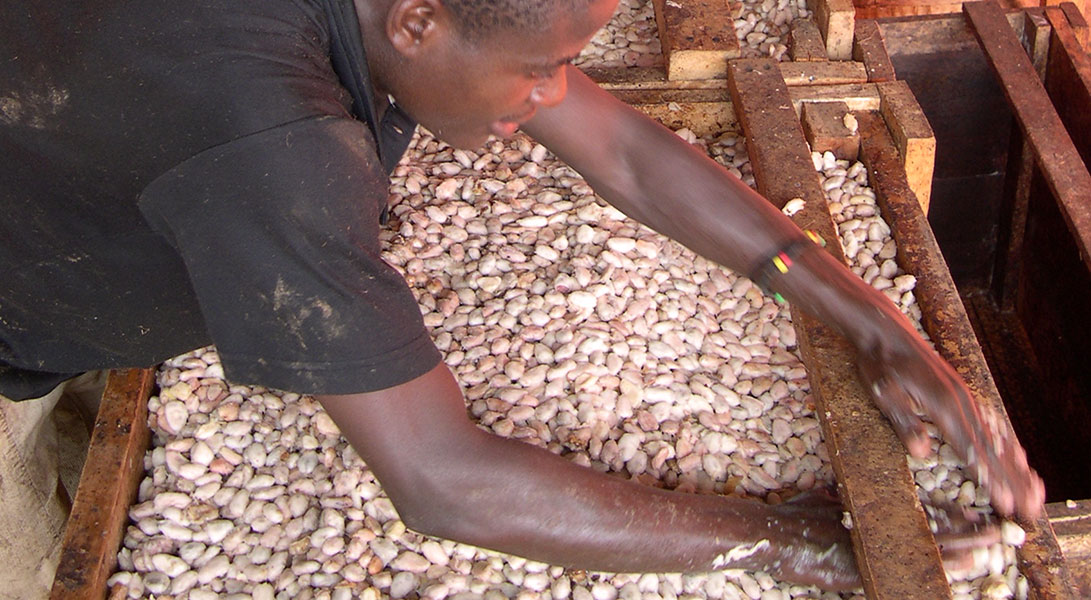
African potential: to have the opportunity to cultivate exceptional cocoa, but not have the knowledge or the techniques to do so. ICAM in Uganda is implementing a project to help the country to free themselves from poverty and to become a new key player in the world of chocolate.
We spoke with Angelo Agostoni, president of ICAM, the company based in Lecco which has produced quality chocolate for 60 years.
A brief history
It is essential to give some key facts and information surrounding the project started by ICAM in Uganda; “The idea took shape in 2009-2010, when the bishop of Kampala mooted the idea to us of introducing cocoa plantations to Uganda. After careful consideration, based on my previous experiences in that country, I realized that more than just growing new plantations, a deal was made to participate in the preparation of cocoa. The project developed rapidly in Bundibugyo. The area has its own history, for many years the farmers here have been dedicated to the cultivation of cocoa. In previous trips I was hit by the bitterness expressed by farmers who did not understand why cocoa traders did not to pay attention to quality, so were surprised to find in me a partner interested in their problems and ready to help resolve them.
In advancing our project we had to take the fractioning of the plantations into account, as it does not allow farmers to earn enough money and devote the necessary attention to cocoa production. To get an excellent product takes dedication, time, attention and knowledge. In particular, the fermentation and drying steps have to be followed with care. To achieve excellence we must help the farmer to cope with any difficulties that they may encounter. The fermentation times must be respected; they cannot be prolonged indefinitely; drying should be done in the sun and, therefore, you have to deal with the fact that in Uganda it rains for several months. “ICAM applied the model of collection centers which is already successful in Latin America, where the fruit is given fresh, right out of the pod. The construction of a fermentation and drying center has allowed us to overcome many problems. Fresh seeds from the pod, transported to the center, are processed by professionals. The centralized structure makes it possible to perfect the fermentation process. Drying can be carried out even during periods of rain through the use of ventilated tables, provided with a plastic cover which protects the fruit from the rain, but that allows sunlight to filter through. In this way, you can get a good product, able to meet the demands of the international market.”
The importance of the human factor
“We buy directly from the farmers”, continues Dr. Angelo Agostoni, “guaranteeing them the price and carrying out the fermentation and drying ourselves. In this way, we offer them the opportunity to devote more time and attention to cultivation and also allowing them to split their time with a second activity, doubling their income. Also initially, to prevent theft, the fermentation and drying of cocoa took place in homes, causing rusting of metal roofs and consequent health problems. At the beginning we struggled with some difficulty in gaining their trust but then the farmers eventually accepted our initiative with enthusiasm. The project was gradually accepted in Uganda and became a success. To this end, it was the cooperation of Fabiano Giomo which spurred on the project as a contributor to the ICAM project. Fabio is a young man, who has behind him volunteer experience in Uganda, where he started a family, is highly respected, has a strong charisma, and is widely considered as an honorary Ugandan. With our initiative we believe that we have contributed to the improvement of cocoa production. The other buyers of cocoa have consequently improved the supply chain, creating a different relationship with the population. Only 10 years ago Ugandan cocoa was not considered amongst the best in the world, but today the ICAM project has helped to improve the quality and to ensure that the market gives Ugandan cocoa another glance.”
A desire to create more sustainability
“What do I expect for the future? We are ready to make our knowledge and our passion available but we also need the government and agencies to believe in the project in order to provide financial support to farmers to increase productivity and promote a model of success. I am convinced that the plantation output can be increased fivefold. You can change the selection of plants with the construction of nurseries; you can apply genetic knowledge to improve production. We must also find a way to rationalize property ownership.”